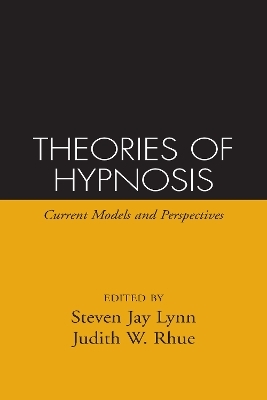
Theories of Hypnosis
Guilford Publications (Verlag)
978-0-89862-343-7 (ISBN)
- Titel z.Zt. nicht lieferbar
- Versandkostenfrei innerhalb Deutschlands
- Auch auf Rechnung
- Verfügbarkeit in der Filiale vor Ort prüfen
- Artikel merken
The streamlined organization of the volume facilitates the reader's ability to contrast and compare research findings and concepts across theories. In the introductory chapters, the editors describe hypnosis paradigms and schools of thought, including major points of convergence and divergence, as well as a broad vista of different perspectives on the history of hypnosis. The theoretical chapters that follow present definitive statements by an international array of eminent scholars who are at the forefront of conceptual advances in the realms of clinical and experimental hypnosis. Their contributions, written in lively first-person narratives, explore current thinking about hypnosis and represent important clinical and research traditions that extend beyond the territory of hypnosis to mainstream psychology.
Providing a thorough discussion of hypnotic phenomena, the book tackles tough questions such as whether hypnosis evokes an altered state of consciousness; whether hypnotic behavior is involuntary; whether hypnotizability is stable, trait-like, and modifiable; and whether hypnotic and non-hypnotic behavior can be distinguished in meaningful ways. The diversity of viewpoints, including competitive ones, illuminates the debates which have expanded the frontiers of knowledge about hypnosis. In the concluding section, the editors compare and contrast these theories, discuss pertinent research issues, and lay out an agenda for future research.
Given its stellar list of contributors and the unique niche it occupies as the first authoritative survey of its kind, THEORIES OF HYPNOSIS is of value to anyone interested in the topic. The editors' ten years of experience teaching hypnosis to psychology and medical students has resulted in a book with enormous appeal to students and instructors, as well as clinicians and researchers. A wide variety of professionals--academics, clinical psychologists, psychiatrists, social workers, dentists--will find it an authoritative introduction and invaluable reference to this still-growing, ever-fascinating field.
Steven Jay Lynn, PhD, ABPP, until his death in 2024, was Distinguished Professor of Psychology at Binghamton University, State University of New York (SUNY), where he served as Director of the Doctoral Program in Clinical Psychology and Director of the Psychology Department's Psychological Clinic. Recognized as a leading expert in the field of hypnosis, he published on topics including psychotherapy, hypnosis, science versus pseudoscience, psychopathology, and memory. Dr. Lynn was founding editor of the American Psychological Association journal Psychology of Consciousness. He was a recipient of the SUNY Chancellor’s Award for Excellence in Scholarship and Creative Activities.
I. HISTORICAL PERSPECTIVES
1. Early Theories of Hypnosis: A Clinical Perspective, Melvin A. Gravitz.
2. History and Historigraphy of Hypnosis, Nicholas P. Spanos & John F. Chaves.
II. SINGLE-FACTOR THEMES
The Neodissociation Perspective
3. A Neodissociation Interpretation of Hypnosis, Ernest R. Hilgard.
4. A Neodissociative Critique of Spanos's Social-Psychological
Model of Hypnosis, Kenneth S. Bowers & Thomas M. Davidson.
5. Hypnotizability: Individual Differences in Dissociation and
the Flexible Control of Psychological Processes, Frederick J. Evans.
Hypnosis as Psychological Regression
6. Hypnosis as a Special Case of Psychological Regression, Michael R. Nash.
Hypnosis as Relaxation
7. Anesis, William E. Edmonston, Jr.
III. CLINICAL PERSPECTIVES
8. The Locksmith Model: Accessing Hypnotic Responsiveness, Joseph Barber.
9. Ericksonian Hypnotherapy: A Communications Approach to Hypnosis, Jeffrey K. Zeig & Peter J. Rennick.
IV. THE SOCIAL-COGNITIVE PERSPECTIVE
10. Role Theory: Hypnosis from a Dramaturgical and Narrational
Perspective, William C. Coe & Theodore R. Sarbin.
11. A Social-Cognitive Approach to Hypnosis, Nicholas P. Spanos.
12. Compliance, Belief, and Semantics in Hypnosis: A Nonstate,
Social-Cognitive Perspective, Graham F. Wagstaff.
13. An Integrative Model of Hypnosis, Steven Jay Lynn & Judith W. Rhue.
14. The Social Learning Theory of Hypnosis, Irving Kirsch.
15. The Ecosystemic Approach to Hypnosis, David P. Fourie.
V. INTERACTIVE-PHENOMENOLOGICAL MODELS
16. Two Disciplines of Scientific Hypnosis: A Synergistic Model, Robert Nadon, Jean-Roch Laurence, and Campbell W. Perry.
17. Hypnosis, Context, and Commitment, Peter W. Sheehan.
18. The Construction and Resolution of Experience and Behavior in Hypnosis, Kevin M. McConkey.
19. Toward a Social-Psychobiological Model of Hypnosis, Eva I. Banyai.
VI. CONCLUSIONS
20. Hypnosis Theories: Themes, Variations, and Research Directions, Steven Jay Lynn & Judith W. Rhue.
| Erscheint lt. Verlag | 27.11.1991 |
|---|---|
| Reihe/Serie | The Guilford Clinical and Experimental Hypnosis Series |
| Verlagsort | New York |
| Sprache | englisch |
| Maße | 156 x 234 mm |
| Themenwelt | Geisteswissenschaften ► Psychologie ► Biopsychologie / Neurowissenschaften |
| Geisteswissenschaften ► Psychologie ► Humanistische Psychotherapien | |
| Medizin / Pharmazie ► Medizinische Fachgebiete ► Psychiatrie / Psychotherapie | |
| ISBN-10 | 0-89862-343-X / 089862343X |
| ISBN-13 | 978-0-89862-343-7 / 9780898623437 |
| Zustand | Neuware |
| Haben Sie eine Frage zum Produkt? |
aus dem Bereich


